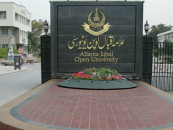‘Kashmir is a place Indians want to know about’
Kashmiri journalist Bashareet Peer's book Curfewed Night was rejected many times before it was published.

“I received letter after letter saying “we love the writing, but we’re sorry”. Most rejections came from England,” Peer told a riveted audience at a session, moderated by Javed Jabbar, of the second Karachi Literature Festival on Sunday.
Surprisingly, India was most receptive towards the possibility of publishing his book. “I had no problems in India. Kashmir is a place Indians want to know about,” the author said.
“Finally, I had to change my publisher and met an American woman over coffee, who told me she will sell my book in two weeks,” he recalled.
English-language readers should be grateful to that American woman, for Peer’s Curfewed Night provokes every reader to think of Kashmir beyond what history books provide.
Peer believes that before 1990, Kashmiris did not know violence. “They were not aware of what violence does to you or to society,” he said. “In residential areas, contact between military and the people is never pleasant,” Peer says, adding that a whole generation of Kashmiris is now coming forward with a will to tell their truth. “A new generation is coming up and bringing out people’s stories. Kashmiri journalist Mirza Waheed has written a book called ‘The Collaborator’ and a young filmmaker is making a movie called ‘Hurd’, which is the Kashmiri word for autumn.”
After 2008, there was a transition in Kashmiri politics, he says. “The phase of Kashmiri-driven insurgency is over. Now, the fight is like the Intifada in Palestine. There is no gunfire, but there is stone-pelting. There are protests. And then, when you talk to people, they tell you their stories. You ask them ‘what did you see’?”
It is what they have seen that Kashmiris carry with them wherever they go.
Peer has written his book from many places – from his home in the capital of Indian Kashmir, Srinagar, to a coffee shop in New Delhi, where he studied at the Aligarh Muslim University and a library in New York City, while he was enrolled at the Columbia University.
For Peer, being in Indian Kashmir was not a requirement to write – his memories were all too clear. “Sometimes, it is important to be in a place that allows you to work.”
Published in The Express Tribune, February 7th, 2011.



















COMMENTS
Comments are moderated and generally will be posted if they are on-topic and not abusive.
For more information, please see our Comments FAQ